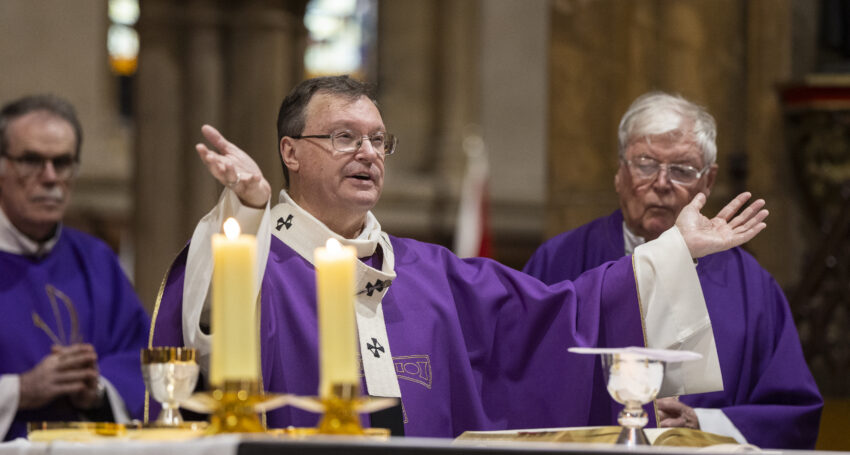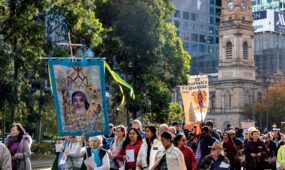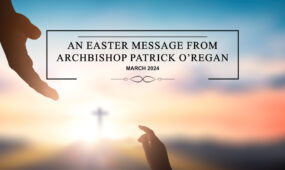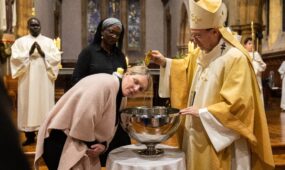Lent: A journey to Easter
Opinion
When we leave on a journey we must know where we are going. So with Lent. Above all, Lent is a spiritual journey and its destination is Easter.

To understand Lent we must understand this connection between Lent and Easter, for it reveals something essential and crucial about our Christian faith and life.
Easter is much more than one of the feasts, more than a yearly commemoration of a past event. We would do well to ask ourselves, in what sense do we celebrate, as we claim we do, ‘the death of death, the annihilation of hell, the beginning of a new and everlasting life…’?
Advertisement
To all these questions, the answer is: the new life which 2000 years ago shone forth from the grave, has been given to us, to all those who believe in Christ. And it was given to us on the day of our baptism, in which, as St Paul says, we ‘were buried with Christ…unto death, so that as Christ was raised from the dead we also may walk in newness of life’ (Rom. 6:4). So at Easter we celebrate Christ’s resurrection as something that happened and still happens to us.
For each one of us received the gift of that new life, and the power to accept it and live by it, at our baptism. It is a gift which radically alters our attitude toward everything in this world, including death. It makes it possible for us joyfully to affirm: ‘Death is no more!’ Oh, death is still there, for sure, and we still face it and someday it will come and take us.
Is it not our daily experience, however, that this faith is very seldom ours, that all the time we lose and betray the ‘new life’ which we received as a gift, and that in fact we live as if Christ did not rise from the dead, as if that unique event had no meaning whatsoever for us? All this because of our weakness, because of the impossibility for us to live constantly by faith, hope and ‘love’ on that level to which Christ raised us when he said: ‘Seek ye, first of all, the Kingdom of God and His righteousness.’ We simply forget all this – so busy are we, so immersed in our daily preoccupations and because we forget, we fail. And through this forgetfulness, failure and sin our life becomes ‘old’ again – a petty, dark and ultimately meaningless journey toward a meaningless end.
Indeed, we live as if He never came. This is the only real sin, the sin of all sins, the bottomless sadness and tragedy of our nominal Christianity.
If we realise this, then we may understand what Easter is and why it needs and presupposes Lent. For we may then understand that the liturgical traditions of the Church, all its cycles and services, exist, first of all, in order to help us recover the vision and the taste of that new life which we so easily lose and betray, so that we may repent and return to it. How can we love and desire something that we do not know? How can we put above everything else in our life something which we have not seen and enjoyed? In short, how can we seek a Kingdom of which we have no idea?
Advertisement
And in the centre of that liturgical life, as its heart and climax, as the sun whose rays penetrate everywhere, stands Easter.
It is the door opened every year into the splendour of Christ’s Kingdom, the foretaste of the eternal joy that awaits us, the glory of the victory which already, although invisibly, fills the whole creation: ‘death is no more!’
The good news of Lent is that God actually wants to do this in our lives. Grace is at work among us.
In the early Church, the main purpose of Lent was to prepare the ‘catechumen’, that is, the newly converted Christian, for baptism which at that time was performed during the Paschal liturgy. But even when the Church rarely baptised adults and the institution of the catechumenate disappeared, the basic meaning of Lent remained the same. For even though we are baptised, what we constantly lose and betray is precisely that which we received at baptism.
Therefore, Easter is our return every year to our own baptism, whereas Lent is our preparation for that return – the slow and sustained effort to perform; at the end, our own ‘passage’ or ‘pascha’ into the new life in Christ.
A journey, a pilgrimage! Yet, as we begin it, as we make our first step into the joyful season of Lent, we see far, far away the destination. It is the joy of Easter, it is the entrance into the glory of the Kingdom and it is the foretaste of Easter that makes Lent’s sadness bright and joyful, and our Lenten effort a ‘spiritual spring’. The night may be dark and long, but all along the way a mysterious and radiant dawn seems to shine on the horizon.
God is good, good indeed. Wishing you a blessed journey to Easter.
Footnote: I am indebted to the great Orthodox priest, theologian and liturgist, Alexander Schmemann for some of these insights, and his book, The Great Lent. Recommended.







